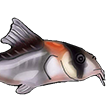Sorry to hear they didn't make it, I have lost smaller fish, tetras etc. without finding bodies but they would get eaten pretty quickly, with a large fish its more surprising.
I think the only way to ensure that any parasites are gone is to know what parasites they are, so you can treat appropriately. You could bleach the tank, substrate, filter media, etc. but they could still survive in a fish being moved to another tank.
When I have lost newly imported fish like this I haven't added any treatment and if there have been other inhabitants they seem to survive fine. I think there are a few explanations for this:
Either there were no parasites and the new fish didn't adjust well to captivity so wasted away.
There were internal parasites, but they didn't leave their hosts (I guess that when a host dies the parasites would leave, but I'm not sure how long that would take, the bodies could be removed before they leave the fish).
The parasites may not be able to find a suitable alternative host.
Or your other healthy fish haven't endured shipping/acclimatisation stress, so can cope with the parasites, and continue living normally.
Deworming plecos who are not eating
- MarcW
- Posts: 875
- Joined: 01 Feb 2011, 15:20
- I've donated: $150.00!
- My images: 4
- My cats species list: 46 (i:9, k:19)
- My aquaria list: 3 (i:1)
- My BLogs: 12 (i:16, p:575)
- My Wishlist: 55
- Spotted: 42
- Location 1: Hampshire
- Location 2: UK
- TwoTankAmin
- Posts: 1478
- Joined: 24 Apr 2008, 23:26
- I've donated: $4288.00!
- My cats species list: 6 (i:0, k:0)
- My BLogs: 2 (i:0, p:48)
- Location 1: USA
- Location 2: Mt. Kisco, NY
- Interests: Fish and Poker
Re: Deworming plecos who are not eating
Sorry they did not make it. My feeling is the fish were in the advanced stages of whatever was afflicting them, not at the beginning. A lot of the internal parasite type problems that end up as "wasting" get missed early one because the fish are eating and nobody spots abnormal poop. Along the way from the wild to your tank they may only look on the thin side and often this is assumed to poor feeding along the way. And then not all the fish in a shipment may have the problem and those that do may be in various stages.
The result is we buy a fish that doesn't look too bad and when it hits the tank it starts to decline more rapidly. This is compounded by having the proper meds to deal with things. I finally decided I needed to keep a medicine kit. Waiting a few days for meds to arrive can be a critical difference. Plus the fish always seem to need meds quickly at times when they can be the hardest to obtain.
Unless you had the right med on hand and were able to begin using it ASAP, there may not have been enough time to effect a cure.
As for the bn that survived and the tank. As noted you can sterilize most everything with bleach except the fish. I would suggest you set up a new tank for them and quarantine them. M it bare bottom to monitor eating and pooping. You might want to consider medicating right away. If they are not infected, then I think they will handle the meds OK and if they are at the early stages of an infection, stopping it now is a good idea. Others may prefer to wait for some symptoms to appear before treating.
The one thing I would suggest is not to allow the "survivors" to have contact with your other fish until you are absolutely certain that this is safe.
The result is we buy a fish that doesn't look too bad and when it hits the tank it starts to decline more rapidly. This is compounded by having the proper meds to deal with things. I finally decided I needed to keep a medicine kit. Waiting a few days for meds to arrive can be a critical difference. Plus the fish always seem to need meds quickly at times when they can be the hardest to obtain.
Unless you had the right med on hand and were able to begin using it ASAP, there may not have been enough time to effect a cure.
As for the bn that survived and the tank. As noted you can sterilize most everything with bleach except the fish. I would suggest you set up a new tank for them and quarantine them. M it bare bottom to monitor eating and pooping. You might want to consider medicating right away. If they are not infected, then I think they will handle the meds OK and if they are at the early stages of an infection, stopping it now is a good idea. Others may prefer to wait for some symptoms to appear before treating.
The one thing I would suggest is not to allow the "survivors" to have contact with your other fish until you are absolutely certain that this is safe.
“No one has ever become poor by giving.” Anonymous
“Everyone is entitled to his own opinion, but not to his own facts.”" Daniel Patrick Moynihan
"The good thing about science is that it’s true whether or not you believe in it." Neil DeGrasse Tyson
“Everyone is entitled to his own opinion, but not to his own facts.”" Daniel Patrick Moynihan
"The good thing about science is that it’s true whether or not you believe in it." Neil DeGrasse Tyson




